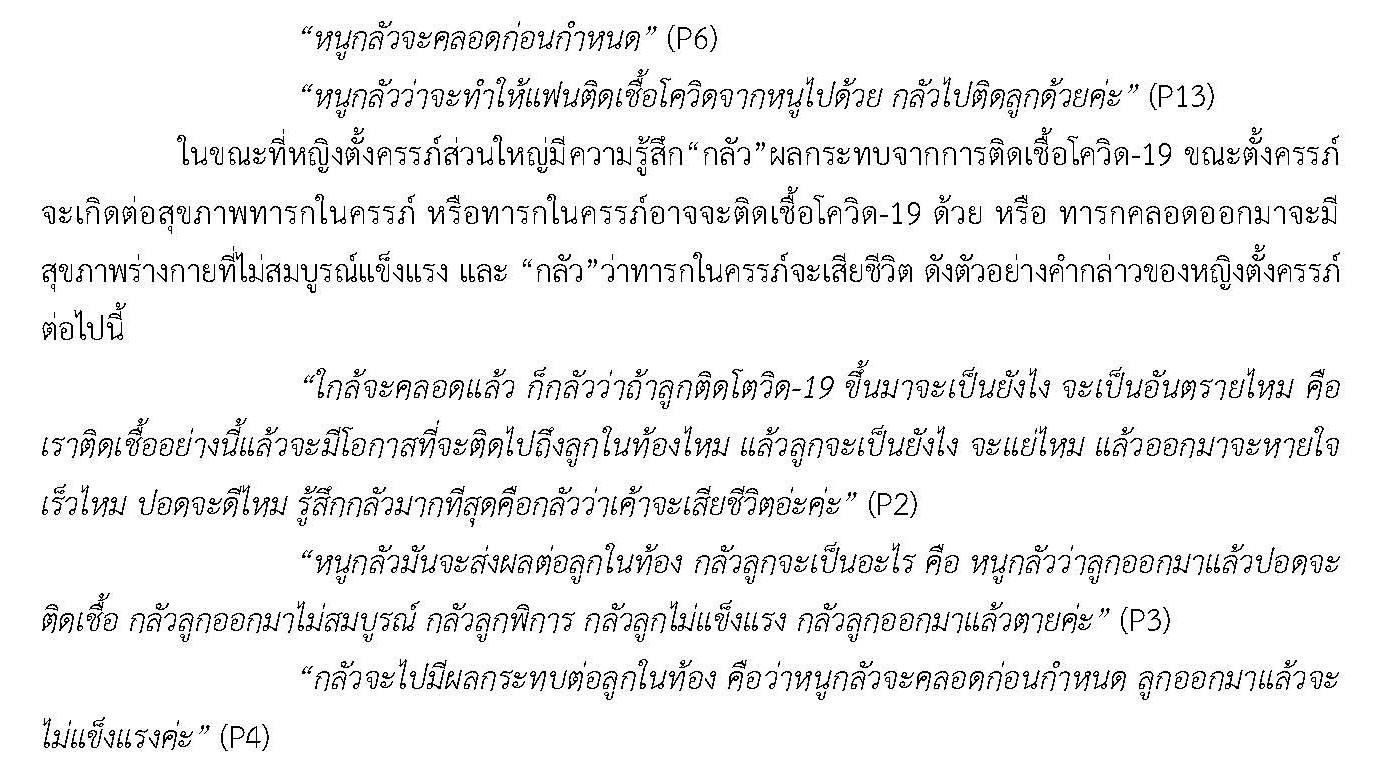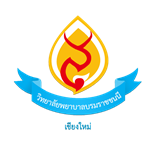Women’s experience of living with covid-19 during pregnancy: A qualitative study
Keywords:
Experience Living with Covid-19, Pregnant WomenAbstract
The objective of this qualitative study to describe the experiences of pregnant women infected with COVID-19. The study selected a specific, targeted sample group of 15 women who had experienced COVID-19 infection during pregnancy, were aged between 20-44 years old, and resided in Nakhon Nayok province. Data was collected through in-depth interviews using a semi-structured questionnaire set and analyzed using Brown and Clarke's six-step thematic analysis.
The research findings identified five main points regarding the experiences of pregnant women with COVID-19 infection: 1) fear and impact of COVID-19 infection during pregnancy; 2) coping with the fear and impact of COVID-19 infection during pregnancy; 3) support for pregnant women infected with COVID-19; 4) knowledge about COVID-19 and post-COVID conditions among pregnant women infected with COVID-19 during pregnancy, and 5) practices to prevent the spread of COVID-19 infection among pregnant women infected with COVID-19 during pregnancy. This study reveals the deep experiences of COVID-19 during pregnancy and the need for assistance desired from the healthcare system to provide knowledge about viral infection in pregnant women, which is crucial for preventing COVID-19 infection during pregnancy and ensuring the quality of life for both mothers and infants in the future.
References
กรมการแพทย์ กระทรวงสาธารณสุข. (2565). การจัดบริการ Home Isolation กรมการแพทย์ กระทรวงสาธารณสุข.สืบค้นเมือ19 มกราคม2567สืบค้นเมื่อ19 มกราคม 256 จาก 25650105180407pm_80ปีhome iso.pdf.
กรมอนามัย กระทรวงสาธารณสุข, (2564). กรมอนามัย เผย หญิงตั้งครรภ์ 898 ราย ติดเชื้อโควิด-19 เร่งขับเคลื่อนฉีดวัคซีนป้องกัน. สืบค้นเมื่อ 1 มิถุนายน 2566 จากhttps://multimedia.anamai.moph.go.th /news/220764-2/
ณัฐนนท์ งามนิล. (2566). ผลกระทบต่อหญิงตั้งครรภ์และทารกแรกเกิดจากการติดเชื้อโควิด-19 ระหว่างกลุ่ม หญิงตั้งครรภ์ที่เคยติดเชื้อก่อนมาคลอดกับกลุ่มหญิงตั้งครรภ์ที่ติดเชื้อขณะมาคลอด. พุทธชินราชเวชสาร, 40(1), 12-21.
พัชรี ราษีกฤษ และกานดา มั่นคง. (2565). การสนับสนุนของครอบครัวกับพฤติกรรมการป้องกันตนเองของผู้สูงอายุต่อไวรัสโคโรนา 2019. ไทยเภสัชศาสตร์และวิยาการสุขภาพ, 17(4), 414-426.
ราชวิทยาลัยสูตินรีแพทย์แห่งประเทศไทย. (2564). แนวทางเวชปฏิบัติของราชวิทยาลัยสูตินิรีแพทย์แห่งประเทศไทย เรื่อง การดูแลรักษาสตรีตั้งครรภ์ที่ติดเชื้อโควิด-19: RTCOG Clinical Practice Guideline Management of Covid-19 Infection in Pregnancy. สืบค้นเมื่อ 1 มิถุนายน 2566 จากhttps://covid19.dms.go.th/backend/Content/Content_File/Covid_Health/Attach/25630324214133PM_CPG-Covid-Preg-20Mar20.pdf.
รุจา แก้วเมืองฝาง, บุญตา สุขวดี และพิมพ์ลดา อนันต์สิริเกษม. (2563). การพยาบาลหญิงตั้งครรภ์ที่ติดเชื้อโควิด-19. วารสารมหาจุฬานาครทรรศน์, 7(11), 371-383.
ศิริกัญญา สมศร. (2565). ผลการรักษาสตรีตั้งครรภ์ที่ติดเชื้อ COVID-19 ในโรงพยาบาลร้อยเอ็ด. ศรีนครินทร์เวชสาร, 37(1), 13-22.
สมาคมเวชศาสตร์ปริกำเนิดแห่งประเทศไทย. (2564). สถานการณ์การติดเชื้อ COVID-19 ในหญิงตั้งครรภ์หญิงหลังคลอด 6 สัปดาห์ และทารกแรกเกิด ระหว่าง 1 ธันวาคม 2563 - 22 พฤษภาคม 2564. สืบค้นเมื่อ 1 มิถุนายน 2566 จาก https://www.thaiperinatal.com/.
สำนักงานพัฒนาธุรกรรมทางอิเล็กทรอนิกส์ กระทรวงดิจิทัลเพื่อเศรษฐกิจและสังคม. (2565). สถิติและข้อมูล: การจัดอันดับตัวชี้วัดระดับสากล และตัวชี้วัดด้านธุรกรรมทางอิเล็กทรอนิกส์. สืบค้นเมื่อ 1 มิถุนายน 2566 จาก https://www.etda.or.th/th/Our-Service/statistics-and-information.aspx.
สุชาดา กุลจิตติพิริยะ. (2566). รายงานกรณีศึกษา การพยาบาลหญิงตั้งครรภ์ติดเชื้อโควิด–19. สืบค้นเมื่อ 24 มกราคม 2566 จาก https://atg-h.moph.go.th/sites/default/files/2023-04/_0.pdf.
สุธิดา อินทรเพชร, เอมอร บุตรอุดม, สุธิดา สิงห์ศิริเจริญกุล และทิพวรรณ ทัพซ้าย. (2564). ผลกระทบของการติดเชื้อโควิด-19 และหลักฐานเชิงประจักษ์ที่เกี่ยวข้องในระยะตั้งครรภ์ ระยะคลอด และระยะหลังคลอด. วารสารโรงพยาบาลชลบุรี, 46(3), 253-262.
สุนทร อินทพิบูลย์. (2566). ภาวะสุขภาพจิตของสตรีตั้งครรภ์และสุขภาพจิตมารดาในระยะ 6 สัปดาห์หลังคลอด ระหว่างการดำเนินชีวิตวิถีใหม่หลังการระบาดของโรคติดเชื้อโคโรนาไวรัส 2019. สืบค้นเมื่อ 22 มกราคม 2566 จาก http://www.rh2.go.th/uploads/documents/wg1/20230710_104031_33_100790.pdf.
Braun, V. & Clarke, V. (2006). Using thematic analysis in psychology. Qualitative Research in Psychology, 3(2), 77-101. https://doi.org/10.1191/1478088706qp063oa
Harrold, J. A., Fallon, V., & Silverio, S. A. (2021). Postpartum women's psychological experiences during the COVID-19 pandemic: a modified recurrent cross-sectional thematic analysis. BMC Pregnancy Childbirth, 21(1), 625. https://doi.org/10.1186/s12884-021-04071-2
Lazarus, R. S. & Folkman, S. (1984). Stress, appraisal, and coping. New York: Springer.
Maude, R. (2021). Long-term effects of COVID-19 or Long COVID-19. Retrieved June 11, 2023 from https://www.rama.mahidol.ac.th/atrama/issue042/health-station.
Mercer, R. T. (1985). The process of maternal role attainment over the first year. Nursing Research, 34(4), 198-204.
Mortazavi, F. & Ghardashi, F. (2021). The lived experiences of pregnant women during COVID-19 pandemic: a descriptive phenomenological study. BMC pregnancy and childbirth, 21(1), 193. https://doi.org/10.1186/s12884-021-03691-y
National Institute of Health. (2022). COVID-19 increases risk of pregnancy complications, study suggests. ScienceDaily. Retrieved January 3, 2024 from www.sciencedaily.com/ releases/2022/02/220207112715.htm.
Poon, L. C., et al. (2020). Global interim guidance on coronavirus disease 2019 (COVID-19) during pregnancy and puperium from FIGO and allied partners: Information for healthcare professionals. International Journal of Gynecology & Obstetrics, 149(3), 273-286. https://doi.org/10.1002/ijgo.13156
Stanczyk, P., Jachymski, T., & Sierozewski, P. (2020). COVID-19 during pregnancy, delivery, and postpartum period based on EBM. Ginekologia Polaka, 91(7), 417-423. https://doi.org/10.5603/gp.2020.0106
World Health Organization. (2021a). Coronavirus disease (COVID-19): Post COVID-19 condition. Retrieved June 11, 2023 from https://www.who.int/news-room/questionsand-answers/item/coronavirus-disease-(covid-19)-post-covid-19-condition.
World Health Organization. (2021b). WHO Coronavirus (COVID-19) Dashboard. Retrieved June 11, 2023 from https://covid19.who.int.
World Health Organization. (2022). Coronavirus disease 2019 (COVID-19). Retrieved June 11, 2023 from https://reliefweb.int/sites/reliefweb.int/files/resources/2022_02_15tha-sitrep-223-covid-19tha.pdf.

Downloads
Published
How to Cite
Issue
Section
License
Copyright (c) 2023 Journal of Nursing and Public Health Research

This work is licensed under a Creative Commons Attribution-NonCommercial-NoDerivatives 4.0 International License.
1. บทความหรือข้อคิดเห็นใด ๆ ที่ปรากฏในวารสารวิจัยการพยาบาลและการสาธารณสุข ที่เป็นวรรณกรรมของผู้เขียน บรรณาธิการไม่จำเป็นต้องเห็นด้วย
2. บทความที่ได้รับการตีพิมพ์ถือเป็นลิขสิทธิ์ของ วารสารวิจัยการพยาบาลและการสาธารณสุข








